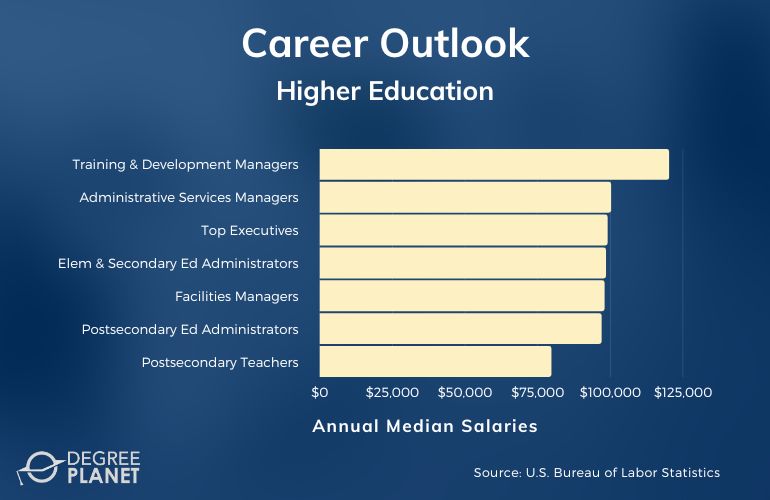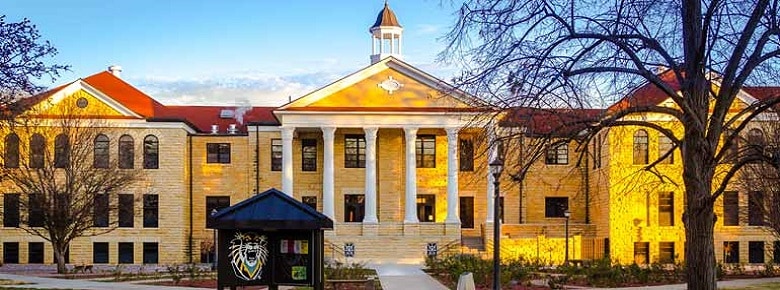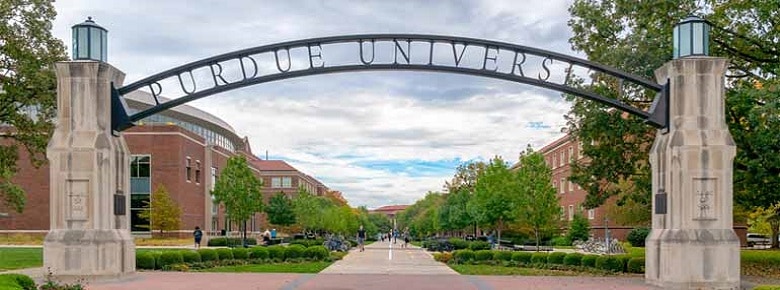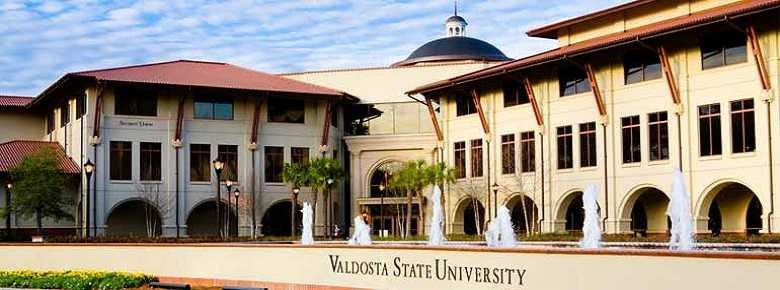A masters in higher education can help prepare you for a career in higher education administration, academic and career advising, and related roles.

The curriculum of the program includes the study of student affairs, higher education issues, administrative roles and responsibilities, instructional design, program evaluation, and more.
Editorial Listing ShortCode:
If you want to be involved in the growth and success of a postsecondary institution by leading higher education initiatives and supporting student development, this degree path might be a fit for you.
Masters in Higher Education Programs Online

Graduate programs in higher education introduce students to concepts, theories, and practices in the higher education sector.
A masters in higher education administration can help you develop the skills needed to drive initiatives in academic policies, drive student support and development, and drive the overall success of a postsecondary institution.
Editorial Listing ShortCode:
There are many components involved in the operation of colleges and universities, and higher education professionals are needed to provide administrative and leadership duties. Some core topics explored in higher education master programs include:
- Organizational leadership
- Higher education administration
- Academic policy and program evaluation
- Student affairs
You may develop a wide range of hard and soft skills throughout your program of study. For instance, you can cultivate essential leadership and project management skills to organize impactful student services or oversee a department.
There are many areas within a higher education institution that graduates may work in, such as academic or student affairs, registrar’s office, teaching, or finances.
Some examples of careers related to higher education include:
- Postsecondary education administrator
- Postsecondary teacher
- Facilities manager
- Administrative services manager
- Instructional coordinator
- Training and development manager
Schools can offer different types of degrees in higher education, such as Master of Arts (MA), Master of Science (MS), or Master of Education (MEd). These degrees serve different purposes.
An MA is interdisciplinary and includes a wider range of studies in the arts and humanities, while an MS is more technical or scientific. An MEd is career-oriented and prepares professionals for jobs in education.
Common Online Masters Degree in Higher Education Specializations

Online masters in higher education programs can offer concentrations that allow you to narrow your area of study. Typical concentrations include:
- College Teaching. Students learn about concepts and applications of curriculum design and teaching methods and models, along with higher education learning assessments and technology.
- Education Policy. Students learn how to analyze and evaluate postsecondary education policies and programs, and they’ll explore the policy-making process and related responsibilities.
- Educational Leadership. This concentration explores instructional leadership, contemporary issues in higher education, community involvement, and other areas that involve leadership responsibilities in the postsecondary setting.
- Student Affairs. This concentration teaches professionals about student service programs offered at the postsecondary level, with an emphasis on student support and engagement, extracurricular activities, and academic success.
- Instructional Design and Technology. This specialized focuses on applications of educational technology, principles of curriculum design and management, and distance learning.
If you’re interested in a specific higher education career, exploring different concentrations offered alongside the program could be beneficial in developing a more specialized skill set.
Higher Education Careers and Salaries

A master’s in higher education can help prepare you for numerous careers found at the postsecondary level, including in community colleges and public or private four-year colleges and universities.
This degree path could be especially beneficial for students or professionals who are interested in a career as a postsecondary education administrator.
According to the Bureau of Labor Statistics, these are the annual median salaries of careers related to the field of higher education.
| Careers | Annual Median Salaries |
| Training and Development Managers | $120,130 |
| Administrative Services Managers | $100,170 |
| Top Executives | $98,980 |
| Elementary and Secondary Education Administrators | $98,420 |
| Facilities Managers | $97,930 |
| Postsecondary Education Administrators | $96,910 |
| Postsecondary Teachers | $79,640 |
| Instructional Coordinators | $63,740 |
| Training and Development Specialists | $61,570 |
| Postsecondary School and Career Counselors and Advisors | $49,430 |
Postsecondary education administrators can perform a wide range of duties, depending on their specific positions. They may determine student admissions numbers, conduct student outreach, review student applications, and analyze student data.
Editorial Listing ShortCode:
Students may also pursue careers in postsecondary teaching, instructional design, or management positions to oversee daily operations for an institution’s facilities or departments. Higher education masters degrees focus on preparing students for various careers at the postsecondary level, but the degree can also be useful for leadership positions at the elementary and secondary level.
Master of Higher Education Curriculum & Courses

The curriculum of a masters program in higher education covers a wide variety of topics, ranging from leadership principles and academic policies to financial management and program evaluation.
Common core and elective courses that may be offered in a masters in higher education program include:
- Contemporary Issues in Higher Education: This course examines past cases of higher education issues to teach you about current issues and how they affect students.
- Higher Education Law and Regulation: You’ll study higher education laws and policies, with an emphasis on how institutions adhere to laws and policies to protect the rights and responsibilities of faculty and students.
- Enrollment Management and Marketing: You’ll learn how to conduct student outreach by analyzing and managing data, studying marketing strategies, and making data-driven predictions.
- Budget and Financial Management in Higher Education: This course focuses on the use of quantitative data and fiscal management models to manage the finances of a postsecondary institution.
- Educational Policy Making: This course reviews common higher education regulations and policies as well as policy making procedures.
- Critical Issues in Student Affairs: This course examines the responsibilities of the student affairs department, exploring student development, privacy and civil rights, and ethical issues.
- Program Evaluation: This course studies the processes of program evaluation by reviewing missions, goals, and values of postsecondary institutions.
- Community College Administration: This course covers learning goals, policies, and student services specific to community college.
- Diversity in Higher Education: This course reviews higher education issues specific to diversity.
- Leadership in Higher Education: Leadership concepts and principles are explored to help you gain skills in project management, planning and organization, decision-making, and communication.
You might have the opportunity to explore electives or concentrations that focus on specific areas in higher education, such as admissions, student affairs, or administration.
How to Choose an Online Master Degree in Higher Education Program

These are some considerations to keep in mind when determining which master degree in higher education is right for you:
- Degree type. There are a few different types of master’s degrees to choose from. The type of degree can affect the type of coursework offered, and the focus may be more theoretical, technical, or career minded.
- Online learning format. There are two main formats offered in most programs for online degrees in education: asynchronous and synchronous learning. Some programs are a mix of asynchronous and synchronous courses, while others may be one or the other.
- Cost of tuition. The cost of tuition can widely vary depending on the institution and whether you’re an in-state or out-of-state student.
- Accreditation status. Accreditation is a mark of a credible school, and the accreditation status of your school can affect several things, such as your eligibility for employment, financial aid, and credit transferability.
Considering various factors like those above can help you narrow down your choices to discover schools and programs that best support your goals.
MA in Higher Education Admissions Requirements

Graduate admissions requirements can vary between schools, and highly competitive institutions may require more materials to be considered for admissions.
These are some general admissions requirements for masters in higher education programs:
- GRE scores (only some schools require them)
- Resume or curriculum vitae
- Official transcripts
- Application essay
Many institutions ask for GRE test scores to determine admissions eligibility, but some schools are ruling out this requirement. Other materials you may be asked to submit along with your application include an application fee and reference letters.
Online Higher Education Masters Programs Accreditation

Regional accrediting organizations conduct extensive reviews of institutions and educational programs to determine whether they meet quality standards. Colleges and universities aren’t required to be accredited, but it can impact students in many ways.
Editorial Listing ShortCode:
Federal financial aid eligibility, postgraduate admissions, credit transferability, and employment opportunities can all be affected by the accreditation status of a school. The Council for Higher Education Accreditation (CHEA) provides a list of regional accrediting organizations and accredited postsecondary institutions to help you review the quality of various schools.
Financial Aid and Scholarships

Financial aid includes state or federal assistance, scholarships, work-study programs, and more. To receive federal aid, financial need must be demonstrated according to various criteria set forth by the US Department of Education.
You can fill out a Free Application for Federal Student Aid (FAFSA) to find out if you’re eligible to receive student loans and other forms of need-based aid. Scholarships are offered by different types of organizations, such as schools, government agencies, and nonprofits. Employers may also offer tuition benefits to employees who are furthering their education.
What Can You Do with a Masters in Higher Education Degree?

A masters in higher education is a versatile degree. It provides students with the opportunity to learn key leadership and administrative skills that are applicable to numerous roles at postsecondary institutions.
Postsecondary education administrators typically need at least a master’s degree to enter the occupation. These roles can be found in various departments, such as admissions, student affairs, education policy, finance, and more. A higher education master’s degree can also help you pursue similar occupations.
For instance, some graduates go on to become administrative services and facilities managers, postsecondary teachers, instructional coordinators, training and development specialists, and school advisors.
How Long Does It Take to Get a Masters in Higher Education Online?

It usually takes 1 year to 2 years to complete a master’s in higher education. A number of factors can affect the length of a program, such as enrollment status, number of credit hours, and thesis requirements.
Editorial Listing ShortCode:
A 36 credit hour program with no thesis required may be completed in 1 year if you’re enrolled full-time and take courses during the summer. Some programs do require a thesis, which can add on additional time. It can also take longer to complete if you’re enrolled as a part-time student.
What’s the Difference Between Masters Programs in Higher Education vs. Secondary Education?

A master’s degree in higher education and a master’s in secondary education have two very different focuses.
A masters in higher education focuses on:
- Leadership principles in higher education
- Administrative responsibilities in postsecondary institution departments
- Postsecondary student affairs, academic policies, and program evaluation
A masters in secondary education concentrates on:
- Instructional design and technology for grades 6-12
- Secondary-level teaching methodologies
- Student assessments at the secondary level
A master’s in secondary education prepares professionals for careers at the middle and high school levels, while a master’s in higher education prepares professionals for careers found at the postsecondary level.
Is an Online Master’s in Higher Education Worth It?

Yes, an online master’s in higher education is worth it for many students. It can be an especially beneficial degree if you wish to gain skills and knowledge essential to entering the higher education sector as an administrator, instructional coordinator, or similar role.
Editorial Listing ShortCode:
Earning your degree online may give you more flexibility and allow you to gain work experience or maintain other responsibilities while completing your degree. According to the Bureau of Labor Statistics, the higher education field is a growing market, with 7% job growth expected for postsecondary education administrators over the next ten years.
Universities Offering Online Masters in Higher Education Degree Programs
Methodology: The following school list is in alphabetical order. To be included, a college or university must be regionally accredited and offer degree programs online or in a hybrid format.

Abilene Christian University offers a Master of Education in Higher Education program online. Potential concentrations include Academic Advising, Enrollment Management, or Student Affairs Leadership. The program requires the completion of 33 credit hours, which may be done in about 21 months of full-time study.
Abilene Christian University is accredited by the Southern Association of Colleges and Schools Commission on Colleges.

Appalachian State University offers an online program for a Master of Arts in Higher Education. Common courses include Higher Education Finance, The 21st Century College Student, and Organization and Governance in Higher Education. The program requires the completion of 36 credit hours, and classes are typically attended part-time.
Appalachian State University is accredited by the Commission on Colleges of the Southern Association of Colleges and Schools.

Caldwell University offers a Master of Arts in Higher Education program fully online. Potential specializations include Student Affairs, Enrollment Management, Resource Management, and Human Resources. The program aims to teach skills in leadership, business, and education in a higher education environment. The completion of 36 credits is required.
Caldwell University is accredited by the Middle States Commission on Higher Education.

Capella University offers a Master of Science in Higher Education program online with tracks in Adult Education and Higher Education Leadership and Administration. Courses commonly teach key concepts like law and governance, politics, institutional development, financial management, education history, and ethics. This completion of 36 credit hours is required.
Capella University is accredited by the Higher Learning Commission.

Central Washington University offers a Master of Education in Higher Education program online. The program is designed to help prepare for entry into careers in settings such as universities, colleges, civic organizations, non-profits, and government agencies. The completion of at least 45 credit hours is required.
CWU is accredited by the Northwest Commission on Colleges and Universities.

Fort Hays State University offers an online program for an MS in Education. Potential courses include Student Development Theory, Supporting Student Success, and Leadership in Higher Education. The program aims to teach the knowledge and skills required for career advancement in higher education settings. The curriculum consists of 36 credits.
FHSU is accredited by the Higher Learning Commission.

Grace College offers an online program for an MS in Higher Education. The program aims to teach the skills needed to enter career roles such as student affairs administrator, career services counselor, dean of students, or learning center coordinator. Admission to the program typically requires a completed bachelor’s degree with a minimum 2.75 GPA.
Grace College is accredited by the Higher Learning Commission.

Grand Valley State University offers a hybrid program for a Master of Education in Higher Education. Concentrations include Adult and Higher Education or College Student Affairs Leadership. Common courses include Educational Policy, Critical Issues in Higher Education, and Intervention Strategies. Classes are typically 15 weeks long.
Grand Valley is accredited by the Higher Learning Commission.

Liberty University offers a Master of Education in Higher Education program online. Concentrations include Educational Leadership, Instructional Design and Technology, and Student Affairs. Classes are usually 8 weeks long, and on average, the 30 required credit hours are completed 1 year studying full-time.
Liberty University is accredited by the Southern Association of Colleges and Schools Commission on Colleges.

Messiah University offers an MA in Higher Education with classes offered primarily online, but with yearly on-campus intensives in the summer. Specializations include Academic Support, Athletic Leadership, Student Affairs, and Strategic Leadership. The program requires the completion of 36 credits. Intelligent.com has ranked Messiah’s program in the Top 45 Masters in Higher Education Program list.
Messiah University is accredited by the Middle States Commission on Higher Education.

Michigan State University offers a Master of Arts in Higher, Adult, and Lifelong Education program online. The program aims to prepare graduates to support students with a diverse range of ages, educational backgrounds, and professional experience. The program requires the completion of 30 credits, and admissions are typically offered 2 times each year.
Michigan State University is accredited by the Higher Learning Commission.

Ohio University offers a Master of Education in Higher Education program online. Courses typically cover topics like higher education history, leadership skills, organizational development, theories of teaching and learning, educational diversity, and research methods. The program is designed to be completed in as few as 5 semesters of full-time study.
Ohio University is accredited by the Higher Learning Commission.

Purdue University offers a Master of Science in Higher Education program online. Concentrations include College Teaching, Student Affairs, and College Administration and Leadership. Classes typically run 10 weeks each. On average, with full-time attendance, the 50 required credit hours are completed in 1.5 years.
Purdue University is accredited by the Higher Learning Commission.

Texas A&M University–Commerce offers a Master of Science in Higher Education program online. The program is designed to teach the knowledge and skills needed for careers such as college instructor, career counselor, academic advisor, program administrator, or dean. This 30 credit curriculum typically culminates in a final project rather than a traditional master’s thesis.
Texas A&M University – Commerce is accredited by the Southern Association of Colleges and Schools Commission on Colleges.

The University of Houston offers an online program for a Master of Education in Higher Education. The program seeks to teach the knowledge needed to serve as leaders in a wide variety of educational settings. The program aims to offer additional hands-on experience through graduate assistantships, internships, and other professional development opportunities.
The University of Houston is accredited by the Southern Association of Colleges and Schools Commission on Colleges.

The University of Mississippi offers an online program for a Master of Arts in Higher Education. The program is intended to serve as a bachelor’s degree completion option and requires a minimum 3.0 GPA for admission. Work experience of a minimum of 3 or more years in higher education is strongly preferred.
The University of Mississippi is accredited by the Southern Association of Colleges and Schools Commission on Colleges.

The University of Missouri–St. Louis offers an online accelerated program for an M.Ed in Adult and Higher Education. Potential courses include Curriculum in Higher Education, Enrollment Management and Student Retention, and Psychological Development of Emerging Adults. Classes tend to be 8 weeks long, and the program requires the completion of 30 credit hours.
UMSL is accredited by the Higher Learning Commission.

The University of West Alabama offers an online program for an MEd in Student Affairs. Typical required courses include Techniques of Educational Research, Educational Statistics, and Advanced Educational Psychology. Classes usually run 8 weeks each, and on average, attending full-time results in completing the 33 required credits in 1 year.
The University of West Alabama is accredited by the Southern Association of Colleges and Schools Commission on Colleges.

Valdosta State University offers an online program for a Master of Education in Higher Education Leadership. The curriculum typically teaches key concepts like administration, governance, student development, assessment, research, and finance. The program requires the completion of a minimum of 36 credit hours while maintaining at least a 3.0 GPA.
VSU is accredited by the Southern Association of Colleges and Schools Commission on Colleges.

Walden University offers an online program for an MS in Higher Education. Concentrations include Adult Learning, College Teaching and Learning, Enrollment Management, Global Higher Education, Online and Distance Learning, and Leadership for Student Success. The 30 required credit hours may be completed in as few as 20 months when attending full-time.
Walden is accredited by the Higher Learning Commission.
Getting Your Master’s Degree in Higher Education Online

Online masters in higher education programs are designed to prepare professionals for a career at a postsecondary institution. Career options can vary depending on your specific interests and the type of higher education degree you choose.
You can often add on a concentration, if available, to your online teaching degree. This may help to narrow the focus of your program and acquire a specialized skill set. Higher education administration careers can be found in various departments, such as admissions, finance, student affairs, education policy, and more.
You can take the first steps toward earning your advanced degree by exploring accredited higher education masters programs that best support your goals.

